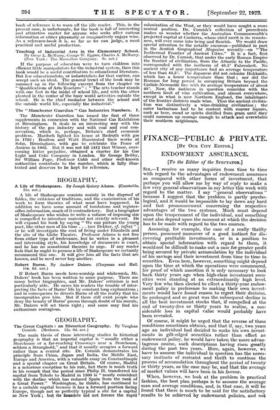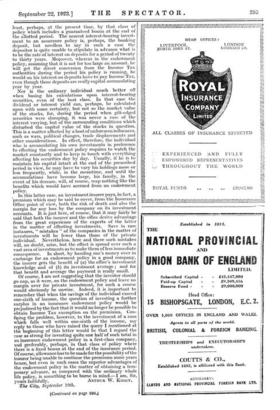FINANCE-PUBLIC .& PRIVATE.
[BY OUR CITY EDITOR.]
ENDOWMENT ASSURANCE.
[To the Editor of the SPECTATOR.] SIR,—I receive -so many inquiries from time to time with regard to the advantages of endowment assurance as compared with other forms of investment, that perhaps you will allow me by way of reply to make a few very general observations in any letter this week with regard to the matter. I say ",general observations " because I suggest that the problem is partly psycho. logical, and it would -be impossible to lay down any hard and fast pronouncement concerning the respective advantages of the two systems. Much must depend upon the temperament of the individual, and something must also depend upon the moment at which the decision has to be made with regard to the two courses.
Assuming, for example, the case of a really -thrifty person, possessed moreover of a good instinct for dis- covering profitable investments, or in a position to .obtain special information with regard to them, -it -would not be difficult to make out a case for greater profit being secured by private accumulation by the individual of his savings and their investment from time to time in securities. Even here, however, something might depend upon the time at which the operations were commenced, for proof of which assertion it is only necessary to look back thirty years ago when high-class investment secu- rities were standing at an extraordinarily high level. Very few who then elected to effect a thirty-year endow- ment policy in preference to making their ,own invest- ments would have found reason -to regret their decision. So prolonged and so great was the subsequent decline in all the best investment stocks that, if compelled at the end of twenty-five or thirty years to realize, a con- siderable loss in capital value would probably have been revealed.
Of course, it might be urged that the reverse of these conditions sometimes -obtains, and that if, say, two years ago an individual had decided to make his own invest- ments in gilt-edged securities rather than effect an endowment policy, he would have taken the more advan- tageous course, such descriptions having risen greatly during the past two years. Here, again, however, we have to assume the individual in question has-the neces- sary instincts of restraint and thrift -to continue the process of accumulation throughout the period of twenty or thirty years, as the case may be, and that the average of market values will have been in his favour.
When, however, we look at the problem in practical fashion, the best plan perhaps is to assume the average man and average conditions, and, in that. case, it will be found that there is much to be said for the satisfactory results to be achieved by endowment policies. and not least, perhaps, at the present time, by that class of policy which includes a guaranteed bonus at the end of the allotted period. The nearest interest-bearing invest- ment to an assurance policy is, perhaps, the banking deposit, but needless to say in such a case the depositor is quite unable to stipulate in advance what is to be the rate of interest on deposits for a period of twenty to thirty years. Moreover, whereas in the endowment policy, assuming that it is not for too large an amount, he will get the direct concession from the Income Tax authorities during the period his policy is running, he would on his interest on deposits have to pay Income Tax, even though those deposits are really capital accumulating year by year. Nor is the ordinary individual. much better off when basing his calculations upon interest-bearing securities, even of the best class. In that case the dividend or interest yield can, perhaps, be calculated upon with some certainty, but not so the market value of the stocks, for, during the period when gilt-edged securities were slumping, it was never a case of the interest varying, but of the surrounding conditions which disturbed the capital value of the stocks in question. This is a matter affected by a host of unforeseen influences, such as wars, political changes, trade displacements and other considerations. In effect, therefore, the individual who is accumulating his own investments in preference ft) effecting the endowment policy requires to watch the market constantly and to keep in touch with everything affecting his securities day by day. Usually, if he is to maintain his capital intact at the end of the prescribed period in view, he may have to vary his holdings more or less frequently, while, in the meantime, and until the accumulations have become large, his family, in the event of his decease, will, of course, reap nothing like the benefits which would have accrued from an endowment policy. In this latter case, an investment insurer pays, in fact, a premium which may be said to cover, from the Insurance Office point of view, both the risk of death and also the margin- for any loss by the company on its investment accounts. It is just here, of course, that it may fairly be said that both the insurer and the office derive advantage from the great experience of the experts of the latter in the matter of effecting investments. Save in rare instances, " mistakes " of the companies in the matter of investments will be fewer than those of the private individual. Nevertheless, here and there such mistakes will, no doubt, arise, but the effect is spread over such a vast area of investments as to make them of less immediate consequence. In short, by handing one's money over in exchange for an endowment policy in a good company, the insurer gets the benefit of (a) the office's investment knowledge and of (b) its investment average ; and for that benefit and average the payment is really small. Of course; I am not suggesting that the investor should go nap, as it were, on the endowment policy and leave no margin over for private investment, for such a course would obviously be unwise. Indeed, it is important to remember that when the savings of the individual exceed one-sixth of income, the question of investing a further surplus in an insurance endowment policy would be prejudiced by the fact that it would no longer be possible to obtain Income Tax exemption on the premiums. Con- king the problem, however, to the investment of a sum which falls well within one-sixth of the income, my reply to those who have raised the query I mentioned at the beginning of this letter would be that I regard the case as strong for investing quite one half of such total in an insurance endowment policy in a first-class company, and preferably, perhaps, in that class of policy where there is a fixed bonus at the end of the insurance period. Of course, allowance has to be made for the possibility of the insurer being unable to continue the premiums some years hence but even in such cases the superior advantages of the endowment policy in the matter of obtaining a tem- porary advance, as compared with the ordinary, whole life policy, is something to be borne in mind.—I am, Sir, yours faithfully, ARTHUR W. KIDDY. The City, September 19th.
(Continued on page 390.)







































 Previous page
Previous page